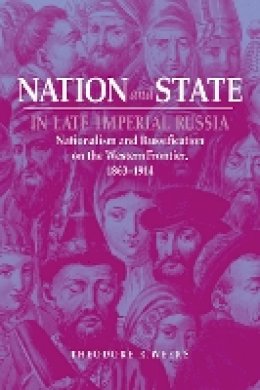
Nation and State in Late Imperial Russia
Theodore R. Weeks
If one were to pick a single explanation for the fall of the tsarist and Soviet empires, it might well be Russia's inability to achieve a satisfactory relationship with non-Russian nationalities. Perhaps no other region demonstrates imperial Russia's "national dilemma" better than the western provinces and Kingdom of Poland, an extensive area inhabited by a diverse group of nationalities, including Poles, Jews, Ukrainians, Belorussians, Russians, and Lithuanians. Taking an in-depth look at this region during an era of intensifying national feeling, Weeks shows that the Russian government, even at the height of its empire, never came to terms with the question of nationality.
Drawing upon little-known Russian and Polish archives, Weeks challenges widely held assumptions about the "national policy" of late imperial Russia and provides fresh insights into ethnicity in Russia and the former Soviet Union. He demonstrates that, rather than pursuing a plan of "russification," the tsarist government reacted to situations and failed to initiate policy.
In spite of the Russians' great distrust of certain minority nationalities—especially Jews and Poles—the ruling elite was equally uncomfortable with the modern nationalism, even in its Russian form. Weeks demonstrates Russia's unwillingness (or inability) to use nationalistic policies to save the empire by examining its dilatory and contradictory actions regarding efforts to institute reforms in the western lands.
Product Details
Reviews for Nation and State in Late Imperial Russia
International History Review
Weeks has made comprehensible for twentieth-century, educated Americans how official and unofficial Russia viewed non-Russians in an area of crucial importance for the future of both the tsarist and Soviet empires-Poland, Belorussia, and the western Ukraine.... The study is unquestionably a significant contribution to its field.
Edward Thaden, University of Illinois at Chicago A very fine piece of work. This is a topic of daunting complexity, and Weeks does it justice. He has used a very impressive array of sources, in almost all the relevant languages. His approach is balanced and careful, and his conclusions are thought-provoking.... It will be a major contribution to our understanding of nationalism in Eastern Europe.
Sam Kassow, Trinity University
